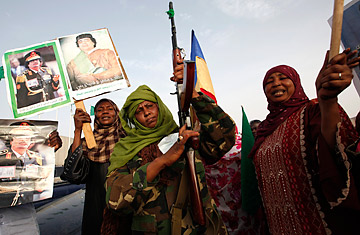
A female Libyan soldier fires in the air during Libyan's leader Muammar Gaddafi supporters march, protesting the coalition air strikes, in front of his compound Bab al-Aziziya in Tripoli, June 7, 2011.
"They told us al-Qaeda fighters infiltrated the country," the shy 16-year old says, standing in a non-descript building in the coastal city of Misratah where rebels are holding their prisoners. Murad nervously bites his nails as he relates how forces loyal to Libyan leader Muammar Gaddafi plucked him out of school and shipped him to fight at the front against a "foreign conspiracy aimed at occupying the country." With half of his country controlled by rebel forces, Gaddafi is having difficulty finding soldiers to fight his battles. Without an effective standing army, he has increasingly relied on teen soldiers, African mercenaries, and more recently women, to defend his 42-year rule.
Since the beginning of an uprising against him in February, Gaddafi has recruited Africans from neighboring countries such as Chad and Niger to fight the rebels. Journalists who visited the eastern city of Ajdabiyah in late March saw dozens of black African corpses of fighting age men. In Misratah, a European told the Associated Press he saw piles of similar bodies, apparently executed in late April. Rebels told him the men were from Mali, Chad, and Niger. A Misrati official with the rebel's political council confirmed this account to TIME. Abd al-Basit Abu Mzirig, in charge of Human Rights for the rebel's Justice division, says he met seven mercenaries who were from Mali, but possessed Libyan identification cards issued after the beginning of the February revolution. Though Gaddafi officials could not be reached for comment, they have previously denied recruiting mercenaries from neighboring countries in the conflict.
"No one whatsoever provided a shred of reliable evidence, a shred of reliable evidence that we imported mercenaries from black Africa to fight," declared Libya's Minister of Information Musa Ibrahim during a press conference last month.
Nevertheless, international organizations have censured Libya for doing so. In the United Nations Security Council resolution authorizing force against Libya, it deplored "the continuing use of mercenaries by the Libyan authorities" and imposed a travel ban on the country's ambassador to Chad and the governor of a southern province for being "directly involved in recruiting mercenaries."
Using African mercenaries is nothing new for Gaddafi. In 1972, he created an "Islamic Legion" composed of nomadic tribes such as the Tuaregs and Toubou that populate the fringes of the Sahara desert. Gaddafi dispatched them to bolster his army units fighting neighboring Chad during a war that lasted from 1978 until 1987.
Gaddafi has been compelled to employ mercenaries because his armed forces are in a decrepit state. He has long neglected his army and marginalized all but its most loyal commanders out of fear that they would overthrow him. More than a dozen coup attempts against Gaddafi during his four decades in power have stoked such suspicions. Seven years of United Nations sanctions against Libya have also taken their toll — the country was prohibited from purchasing weapons because it refused to extradite two men suspected of downing of a 1988 Pan Am flight over Lockerbie Scotland. Military analysts have noted that units are under trained, under equipped, and ill-prepared to fight a war.
But with a flight ban and stepped-up international surveillance making it increasingly difficult for Gaddafi to import African mercenaries, he has turned to barely trained teenaged soldiers to fill his ranks. At the Hikma hospital in Misrata, Dr. Khalid Abu Falqa said he has treated a dozen teenagers sent to fight the rebels. "One was terribly frightened. He was crying for his mom," related the radiologist as he tended to a six year old girl with shrapnel wounds.
Though Murad is reluctant to share many details of his story — including his last name — the teenager relates that after being removed from school, he was trained for three weeks in a small army camp in Gaddafi's capital of Tripoli, with weapons such as 14.5mm anti-aircraft guns. "I never thought I was going to go to the front," the bony child murmurs. "Then one day they came and told us we had to defend the nation." Along with about 90 other 16-to-17 year olds, Murad was bussed out to Misrata around April 3, given a Kalashnikov, and told to fight. His first day at the front proved catastroophic. A heavy salvo of anti-aircraft artillery shredded his left leg. Murad was soon caught and taken to the Hikma hospital, but it was too late to save his leg, which was amputated slightly below the knee. With his life ruined, Murad spends his days hobbling around a room filled with teenagers from Misrata suspected of collaborating with Gaddafi's forces.
But even staffing his front lines with such unfit fighters is not enough to replenish Gaddafi's thinning ranks. Last week, 500 women from a wide range of ages reportedly graduated from a weapons training class in Tripoli and vowed to defend the Libyan leader. Some, however, were so old they could barely lift RPG's onto their shoulders. "Using African mercenaries, child soldiers, and even women shows how hard it is for Gaddafi to fight," says Salwa Dighayli, a rebel official in charge of prisoner affairs. "He has no army and his officers are deserting. He is reaching the end."However, the rebels are still unable to overthrow Gaddafi after a four-month campaign in which virtually the whole world has backed them. The Libyan leader's rag tag medley of foreign mercenaries and teen soldiers have, so far, been good enough to stave off the defeat that everyone continues to predict for him.
